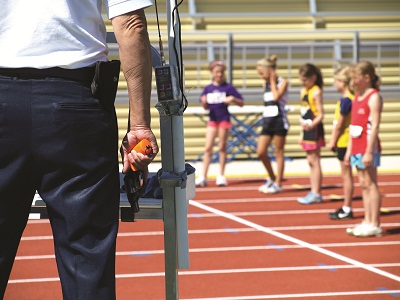
 We've all heard the phrase, "And the crowd goes wild!" We love that phrase; in fact, it's our slogan here at Experience Arlington. But if there's one thing we know for sure, it's that it takes more than a home run, a winning touchdown or an ace on the tennis court to really get the home crowd on its feet. It takes an audience that is excited and happy, and totally supportive before the team even takes the field.
We've all heard the phrase, "And the crowd goes wild!" We love that phrase; in fact, it's our slogan here at Experience Arlington. But if there's one thing we know for sure, it's that it takes more than a home run, a winning touchdown or an ace on the tennis court to really get the home crowd on its feet. It takes an audience that is excited and happy, and totally supportive before the team even takes the field.
And that, we've learned, doesn't start with the crowd. It starts with the planners. If a planner can get the community behind an event, it's going to be a win. The best ambassadors for a city are the people who live there. Sure, the mayor may show up to fire the starting gun or help with the opening ceremonies, but it's the residents who have the real VIP status as far as the athletes are concerned.
It's local residents who will be sitting in the stands, lining the race course or cheering from their windows. And they're the ones the athletes will notice. I don't think I've ever heard any athletes get impressed about a politician from another city who came by to give a speech. But I have seen them say, "Wow, the people in that city were really nice." It's not too hard to figure out which one is going to make them want to come back a second time.
The right kind of preparation can make the difference between whether the community enthusiastically welcomes an event -- or whether they simply shrug and go about their business. But 'preparation' is a pretty broad term, so let's break it down into a few key ingredients.
Strong Connections: The CVB should be connected with everyone: the parks and rec. department, the local restaurant association, the hotels and more. Having strong ties to all parts of the hospitality industry is good, but having those same ties with everyone else in the equation too -- sports facilities, municipalities, local athletic associations and more -- will make everything go better and more smoothly.
Not only does your planning go better if you're dialed in with all the local connections, but it increases the likelihood that you'll be able to problem-solve effectively if something comes up. You may not have all the answers, but you certainly will know the people to ask. That takes a lot of stress off you, and goes a long way toward building good will among your visitors.
Good Communication: There's no doubt about it. The most important aspect of getting your community members fully invested in an event is good communication and transparency through all aspects of the planning process. Making people aware of what's going on is the first step toward getting them involved.
Your biggest fear should not be a losing game; it should be a game that nobody knew or cared about. So the primary goal becomes putting your event on the community's radar. Once the date and timing of an event are set, it's essential to let the community know, and to start involving them in the process. Why? It's simple. Big sporting events (and even some that aren't so big) have the potential to impact a community. There are positive aspects of that (increased income for hotels and restaurants and other local businesses), but there are negative issues as well.
 |
| Jerry Coli - Dreamstime.com |
Take a road race, for example. If it's a marathon with a large number of participants, it may involve an entire day's worth of traffic restrictions such as road closures, detours and parking limitations. It may involve extra cars that fill local parking lots. If it's a 5K with fewer participants, it might just involve a few hours in the morning during which some lanes blocked off to keep runners safe, and during which there was extra police presence.
Either way, local residents should know about the event in advance. It avoids unpleasant surprises and hard feelings. You want your locals excited about an event; you don't want them thinking it's a nuisance. But unless you keep them informed, you're taking everything out of their hands. That's not conducive to building good will. Let people know about the event, and ask for their input (and listen to it), and you'll gain their respect.
Here in Arlington, where the Cowboys and the Texas Rangers are in close proximity, everyone knows about professional sports -- where teams are playing, who they're playing and when they're playing. They already have a sense of the value of those teams. But on the amateur circuit, it takes more effort to keep people involved and aware of goings-on, and that starts at the local level.
Arlington has hosted events for almost every sport you can think of, including the USA Track & Field Youth Outdoor Championships, Lone Star Conference Football Festival, USA Karate National Championships and Team Trial, US Lacrosse - LAX Fest, USA Wrestling - US Open: Greco-Roman & Women's Freestyle, and the list goes on and on. And we make sure everyone knows who we're hosting, and when.
We like to make sure we send out press releases to the local media, telling them about the sports events that are coming into town. We make sure these list the dates, hours and locations of all activities, as well as the number of athletes we're expecting. Distribute as much information as possible, and you not only inform people, you make it easy for the community to be spectators.
As a quick note: Don't just send your notices to big newspapers, TV and radio stations. Send them to small community newspapers as well as neighborhood associations, and post them in social media for all those groups as well. The more you distribute the information, the higher the profile your event takes on, and the more people stay in the loop.
Additionally, the more effort you make to showcase all these events, the prouder the community becomes of the fact that they're the official host. And the more visibly proud the community is, the more welcoming they are, and the better the overall experience is for the athletes and their families. Think about it. Would you rather get a warm welcome or a cold shoulder? Keep the lines of communication open, and the residents will respond in a much more positive manner.
One last word about communication: Make sure that once the event is over, you let the community know just how well the city did as a result of hosting that event. A press release describing economic impact, number of spectators and more will probably be very well received, particularly if it contains a quote from an official with the event, praising the city for its hard work and hospitality. After all, everyone wants to know when they did a good job, and when they're appreciated. Oh, and if a date is already set for the next event, be sure to note that in the same notice. It never hurts to make sure you stay on the map.
 Great Volunteerism: We've learned that one of the great ways to get people involved is just that: to get people involved. Some cities (this includes us at Experience Arlington) keep a database of volunteers. These people can do everything from helping with registration at the start of an event to handing out water to athletes. They can also help with set-up of tables, directing people where to park and more. Never underestimate what a good group of volunteers can accomplish.
Great Volunteerism: We've learned that one of the great ways to get people involved is just that: to get people involved. Some cities (this includes us at Experience Arlington) keep a database of volunteers. These people can do everything from helping with registration at the start of an event to handing out water to athletes. They can also help with set-up of tables, directing people where to park and more. Never underestimate what a good group of volunteers can accomplish.
Beyond just the logistics, though, is this fact: If people are out there working on an event, they're caring about it. They want it to go well. They're going to be friendly and helpful, and that's going to leave a positive impression on the athletes, as well as on those local residents who show up to be spectators. Local hospitality is essential, and the visiting athletes and their families will remember your city fondly.
As a sidelight, we've also seen for ourselves that this can have the result of promoting ongoing growth from within. When local residents don't attend an event, but hear good things from those who did, they will show up the following year to watch the action. When people show up as spectators and see their friends having a great time as volunteers, they can't wait to put their names on the list to help out the next time around. And when people volunteer to work at an event, the next step is often for them to want to participate as athletes rather than stand on the sidelines. Or maybe they'll encourage their children or grandchildren to become involved in sports because they had such a good time. Never underestimate the potential difference a happy volunteer can make.
The Personal Connection: Please don't forget about this one. Not every sports event should be about bringing in out-of-town teams or athletes. If you can plan an event that brings in a lot of community members as contestants, people are quick to develop a sense of ownership. Think about it: if someone can say, 'I played in that tournament' or 'My daughter ran in that race,' that person is invested in that event. It's not just an event that took place in the city; it's something the family was involved in.
That, in turn, can have even more meaningful consequences. Go a few months or even years down the road from the event, and you come upon an election. On the ballot is a bond issue that may allocate money to build some new sports fields or another stadium. Suddenly that bond issue is more than just a lever to pull, and it's so much more than just the words 'taxpayer dollars.' It's a concrete idea a resident can understand. It's something their kids can use, and something that will bring even more fun events to the area. For that voter, the bond issue is relevant and real, and for that reason, it's now a win-win situation.
...And Healthy Realism: No, not everyone in the community is going to get behind your event, but that's not a failure on your organization's part. It's just human nature. For example, even in colleges that have a storied tradition of football or basketball (or any other sport), there are students who just can't get excited. Not during regular season, not during playoff season, not during homecoming, not during a championship game. But in general, those people are an exception, rather than a rule. If you do your part to keep everyone else in the game, you'll see a groundswell of support.
Sports tourism is growing. But sometimes, people fail to realize that it isn't growing in the pro venues; it is growing in the backyards of America. It is growing in baseball fields, soccer complexes, gymnasiums and more. What fuels its fire is a combination of factors, including the ability of cities to develop their reputations as great hosts. Make your city welcoming to, and supportive of these events, and suddenly, that city has become a destination. It's a tradition. Athletes want to go there, and residents want to contribute. And that's a win for everyone.

